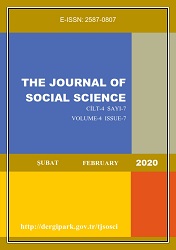ELEŞTİREL DÜŞÜNME VE PROBLEM ÇÖZME BECERİLERİ ARASINDAKİ İLİŞKİ: SAĞLIK HİZMETLERİ ÖĞRENCİLERİ ÖRNEĞİ
THE RELATIONSHIP BETWEEN CRITICAL THINKING AND PROBLEM SOLVING SKILLS: CASE OF HEALTH SERVICES STUDENTS
Author(s): Arzu Yüksel, Ayşe Nihan Aribaş, Emel Bahadır YılmazSubject(s): Vocational Education, Higher Education , State/Government and Education, Health and medicine and law
Published by: Dicle Üniversitesi, Sivil Havacılık Yüksekokulu
Keywords: Critical thinking; problem solving; health services; student;
Summary/Abstract: This research was done as a descriptive study to determine the relationship between critical thinking and problem solving skills of vocational school of health services students. The sample of study consisted of 267 students who attended the vocational school of health services of a state university in the 2019-2020 academic year and accepted to participate to the research. Data were collected by using Student İnformation Form, California Critical Thinking Tendency Scale (CCTTS) and Problem Solving Inventory (PSI). To analyze the data; descriptive statistics, significance test of difference between two means, One-way analyses of variance and Pearson Correlation test were used. 72.4% of students are women and 36% of them are 19 years old. The school success of 56.5% is moderate. It was determined that 53.9% of students always trusted themselves and 53.6% of them perceive themselves as successful in problem solving. The mean score of CCTTS was 242±29.11 and the mean score of PCI was 91.98±19.23. Correlation Analyses showed that there is a strong and negative relationship between critical thinking and problem solve skills (p<0.05). In the comparisons, it was determined that; gender, class, education program, preference of the department, school success, selfconfidence and the ability of problem solving evaluation affect the CCTTS scores (p<0.05). It was determined that PSI score averages affect the preference of the department, social activity, the profession of mother, family relations, school success, self-confidence and problem solving ability (p<0.05). As a result, it was determined that sociodemographic variables affect the students’ mean scores of CCTTS and PSI.
Journal: The Journal of Social Science
- Issue Year: 4/2020
- Issue No: 7
- Page Range: 160-174
- Page Count: 15
- Language: Turkish

